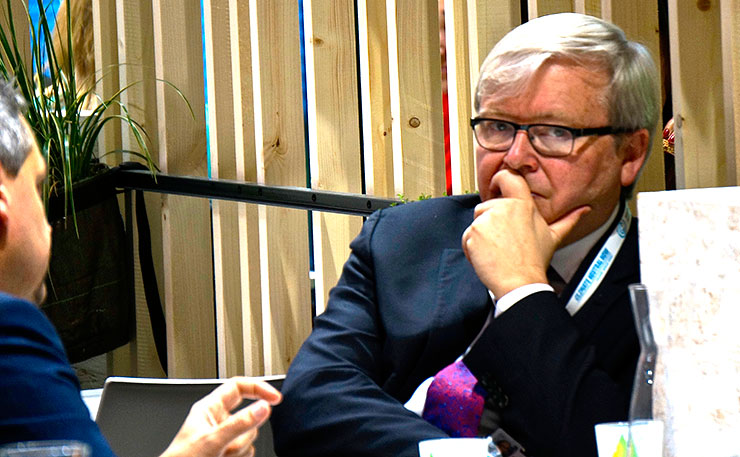As Kevin Rudd twists slowly in the asylum-seeker noose of his own making, it is not only the flimsy basis of his “Indonesian solution” that is exposed to the world. Also exposed is a consistent failure to assume leadership, a failure that has defined the Labor Party for a generation, and that comes at a critical time in our history.
Rudd should have foreseen the likelihood of a resurgence in boatloads of asylum seekers reaching our shores, and could easily have prepared for it. He could have pointed out that the people on board represent a small minority of unscheduled or illegal arrivals annually — and an even tinier proportion of his currently bloated annual immigrant intake. Most asylum seekers have been found to be legitimate and it would be a pretty stupid terrorist who would choose this form of entry into Australia. True, Rudd might have lost a few suburban redneck votes had he done this, but when a prime minister speaks with conviction and authority, people listen.
Even though one might disagree with pretty much everything he did in office, John Howard exercised this kind of leadership. By contrast, Kevin Rudd has consistently failed to exercise leadership. He is a micromanager and a timid poll-follower. He focusses on wedging an Opposition already in disarray, and on maintaining his already-high poll ratings. He dances to the tunes of the big lobbyists, most notably on global warming. He refuses to engage with any big challenges, preferring to skip around the edges, looking for small, easy targets. He plays the puppet, a Clayton’s leader, the one you have when you don’t really have a leader.
Rudd’s lack of strategic thinking extends to the arena in which John Howard waged his culture wars. Howard’s goal was to change Australia’s public culture and to redefine our history, and he was disturbingly successful. He planted his people throughout the bureaucracies and public bodies, and his cronies reciprocated in the private sector. Rudd has done nothing to counter or reverse Howard’s aggressive moves.
Look no further than the ABC Board, which is still stacked with people who hate its public funding, hate its (formerly) independent voice, and who are still at work privatising it by stealth. One day Labor will fall from favour, and the cultural throwbacks and denialists will all still be in their influential positions, ready to reinforce Labor’s well-deserved flirtation with oblivion.
Rudd has presented himself as a Christian of high principle, one who defines his morality through his care for the underdog. He proclaimed his hero to be no one less than Dietrich Bonhoeffer. Bonhoeffer put his life on the line with his publicly opposition to the Nazis, and paid the ultimate price. Rudd, in stark and self-inflicted contrast, is unwilling to risk a few points in the opinion polls, preferring to sacrifice dispossessed and desperate people, and to revert to the fear-driven expedience and heartlessness of his predecessor. In his treatment of asylum seekers, Rudd exposes himself as just another conniving politician, willing to say what he thinks people want to hear. And in doing so, he provides one more example to explain why politicians are among the most despised members in our society.
When Rudd gained the leadership of the parliamentary Labor Party, he raised some prospect of giving Labor some direction, and of reminding it why it exists. The Labor Party’s purpose was to help the underdog, to rebalance the power relationship between the wealthy and the rest: to give everyone a fair go. That purpose had been jettisoned in 1983 when the Hawke-Keating pragmatists took over.
Spooked by the fate of the Whitlam government, unable to see the extraneous forces that helped to undermine Whitlam, and unwilling to challenge and lead, Keating especially proceeded to suck up to the rich and powerful and to implement the neoliberal agenda. That agenda systematically undermined everything the Labor Party was supposed to have represented. Though Rudd argues, correctly, that neoliberalism is discredited, his challenge to it is confined to running a Government deficit. Otherwise market fundamentalism still rules Australia.
The Hawke-Keating pragmatism worked for as long as Labor was in power, but when they lost to Howard, there were few reasons to argue that they should regain power. Why vote for Howard-lite when you could have the real thing? The party survived thanks to the wishful thinking of its rusted-on supporters that it would still be on their side. The rules of our voting system, which require all boxes to be numbered, also helped it survive. This forced Democrat and Greens preferences back to Labor as the marginally lesser of two evils. If Labor had lost 10-15 per cent of preference votes during the Howard years, it might have been jolted into reclaiming its purpose and reasserting some leadership.
People only turned back to Labor when Rudd was able to raise the sentimental hope that the party itself would resurrect its reason for existence. Rudd has by now thoroughly betrayed that hope.
Australia is left with a profound crisis of governance at this most critical time in our brief history. Neither major political power bloc is now interested in governing for ordinary people. They govern for the big lobbyists, the ones who pay their campaign bills, and they dance to the tunes of the media magnates. Our alleged democracy is systemically corrupt.
It is not only dispossessed and desperate asylum seekers who will pay the price of this corruption. As global warming asserts itself earnestly and relentlessly, year after year, the fragile global industrial system will totter and fall. We will see the fragile lucky country progressively laid to waste. It will be our children and their children who become increasingly more dispossessed and desperate.
Donate To New Matilda
New Matilda is a small, independent media outlet. We survive through reader contributions, and never losing a lawsuit. If you got something from this article, giving something back helps us to continue speaking truth to power. Every little bit counts.




